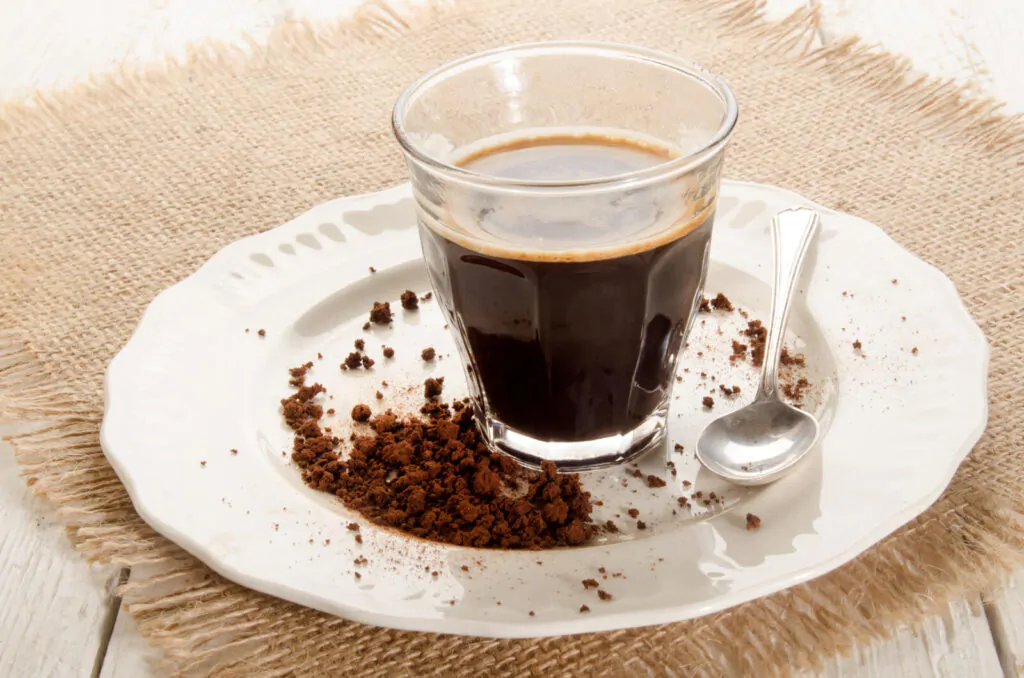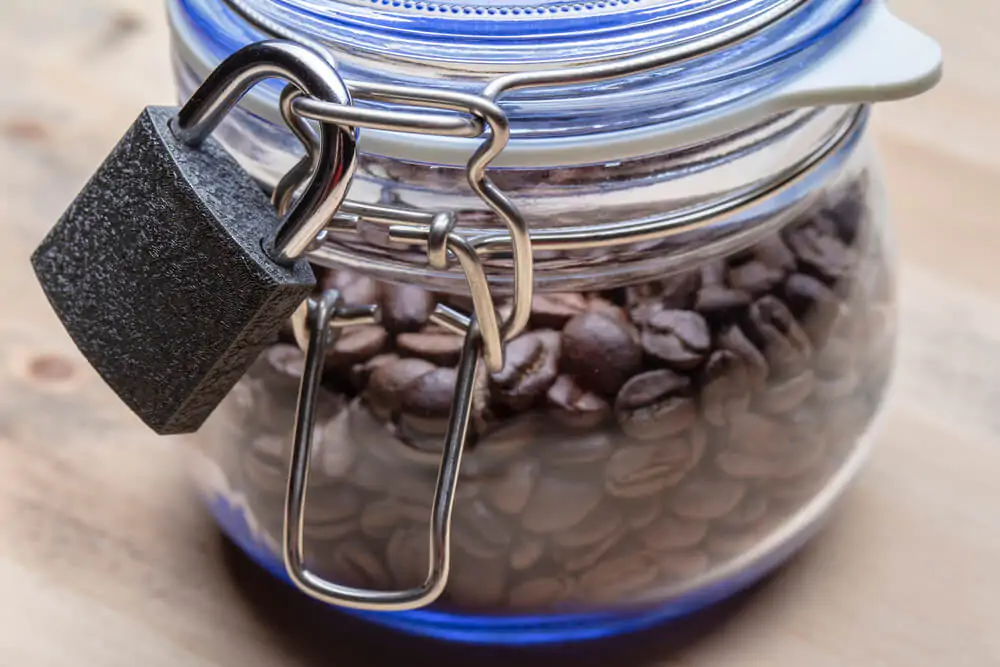Asking ‘how long does coffee last?’ is a little bit like asking, ‘how long is a piece of string?’. Find out what affects and how long coffee beans last.

There is nothing quite like a great cup of coffee in the morning. For coffee lovers, a cup of Joe made from whole beans is the ideal way to start the day.
As a coffee drinker, there is nothing quite like waking up to the smell of freshly brewed coffee. At the same time, coffee only holds its taste if it is made from the freshest coffee beans. Therefore, the question of ‘how long does coffee last’ is an important one for coffee drinkers, with several important factors influencing the answer.
The Shelf Life Of Coffee In All Forms
The expiration date of coffee is going to vary depending on its current state. For example, brewed coffee, ground beans, whole beans, and instant coffee all have different shelf lives. Just look at the difference in their expiration dates at your local grocery store to get an idea.
Instant Coffee

If you are in a pinch, you may reach for instant coffee. Sure, this does not taste as good as fresh coffee, but it gets the job done if you have nothing else at hand. If you have to drink instant coffee, try to consume it within a few weeks of opening the sealed container or jar.
After that, it can go dry, and nobody wants stale coffee, especially if it’s instant stale coffee.
Ground Coffee
A top tip is only to grind the beans you need, as once you grind your coffee, they will expire faster. If you do not have a cup every day, a pre-ground coffee isn’t the bag of coffee you should be buying from your local barista. Buy whole beans instead and grind them as you need them.
Store ground coffee in a dry place, and it will stay fresh for longer. The disappointing fact for people wondering how long ground coffee lasts is that pre-ground coffee goes wrong within a couple of weeks of opening it.
Whole Beans
Out of all the options, whole-bean coffee lasts the longest. Thus, keep your beans on hold until you want to brew them if you want your coffee to be as fresh as possible. Store them in an airtight container, and this will increase their shelf life, and grind them as you need them.
If you have whole beans, using them within five weeks of purchasing them will produce the most high-quality cup of coffee.
Brewed Coffee
If you have already brewed your coffee, go ahead and drink it! After all, that is why you made it in the first place. If you do need to store it for later, try to keep it in the refrigerator or a thermos. There, it will last a little longer.
When Does Coffee Expire: Degradation Factors
Limit light and heat exposure if you want your coffee to last as long as possible. Coffee tends to do best if you store it in a dark, cool, dry place. If you do not keep your coffee beans properly, they will lose their freshness and taste quickly.
Light Exposure
Coffee beans sure look pretty when you store them in a glass jar! On the other hand, glass jars let in light. If you store your coffee beans in direct sunlight, they will go stale quicker. If you want your coffee beans to last as long as possible, place them in a dark, light-resistant jar.
Oxygen And Carbon Dioxide Exposure
Coffee beans and oxygen are not friends. If you expose whole beans to oxygen, they will go rancid in just a few days.
Moisture & Heat
Coffee beans go bad faster if they are exposed to moist environments. Humid conditions can cause your coffee beans to grow mold, mildew, and other types of pathogens that will ruin them quickly. Do not expose it to heat unless you are actively brewing your coffee.
It can sap the coffee beans of all their flavor. Coffee is better when stored in a dry, cool location.
How To Store Coffee

If you would like to store your coffee beans appropriately, there are several tips you should keep in mind. These include:
- Always make sure your coffee is sealed appropriately. Use an airtight, opaque container or a vacuum-sealed bag. That way, the light will not penetrate it.
- Try to avoid purchasing more coffee than you need. Because even whole coffee beans will go rancid in a few weeks, try to avoid buying in bulk. You may even want to use a subscription service if you want to have fresh coffee every morning.
- If you put a bag of open coffee beans in the fridge, it may last a few extra days; however, the stark temperature difference will damage the beans, causing them to lose their flavor. Try to avoid placing coffee beans in the fridge or freezer. If you do, seal the bag to keep it airtight. This could mitigate some of the harm.
- Minimize heat and humidity exposure. Store your coffee jar in a cabinet to prevent a high room temperature from ruining your coffee beans.
If you follow these tips, you can stop your coffee beans from going bad too quickly.
Does coffee go bad in the fridge?
It is not a good idea to store your coffee beans in the fridge as they will take up the moisture and flavors of other foodstuffs stored around them.
How long does coffee last (brewed) in the fridge?
Generally, you can get away with drinking brewed coffee kept in the refrigerator for up to six days. After this point, the flavor starts to diminish, and mold can begin to grow. The best idea is to pour the brewed coffee into a sealable pitcher or container, keeping the air out and improving freshness.
Again, this assumes we are talking about black coffee without sweeteners or cream. You’ll want to wait to put those things in your beverage when you’re ready to drink it.
How long does iced coffee last in the fridge?
During the summer months, drinking iced coffee is a wonderful afternoon treat. However, you don’t want to just plop ice cubes into a hot brew, which can melt and then water down the flavor. The alternative is to brew coffee and keep it cold in the refrigerator for a few days.
Can You Freeze Brewed Coffee?
Yes, you can definitely freeze brewed coffee. In fact, this is a great way to keep from wasting a cup you forgot about after hitting that brew button. Frozen coffee lasts for up to six weeks without losing flavor.
Again, don’t add any special flavors, creams, or sweeteners. Those can always be included when making the beverage you plan to drink. Dairy can sometimes separate during the freezing method, and some sweeteners don’t retain flavor as well after exposure to cold temperatures.
The critical thing to remember when freezing brewed coffee is what you plan to do with it later. Trying to scrape coffee icicles from the bottom of a container can be a pain, so opt for something easy to heat up or remove.
Can You Get Sick from Drinking Old Coffee?
The answer to this typical question depends on what you put in the coffee and the length of time since it was brewed. While the flavor of the coffee starts to deteriorate somewhere between thirty minutes when it cools and four hours, it won’t exactly make you sick. It just won’t taste as good as it did when you first brewed it.
If you’ve added dairy products, the maximum amount of time you have to drink your beverage is two hours. This is when milk and cream start to go bad after sitting out, putting you at risk for stomach issues. And we all know food poisoning is a bigger problem than forgetting a cup of brewed coffee! Wasting one cup of coffee is a much smaller problem than ending up ill by drinking it.
How Can You Tell That Brewed Coffee Has Gone Bad?
If you’re picking up a cup of coffee that is a few hours old, you’ll be able to tell it has gone bad if there’s no aroma. While this might not make you sick, it means that much of the flavor in the brew is gone, and the taste won’t be as enjoyable.
